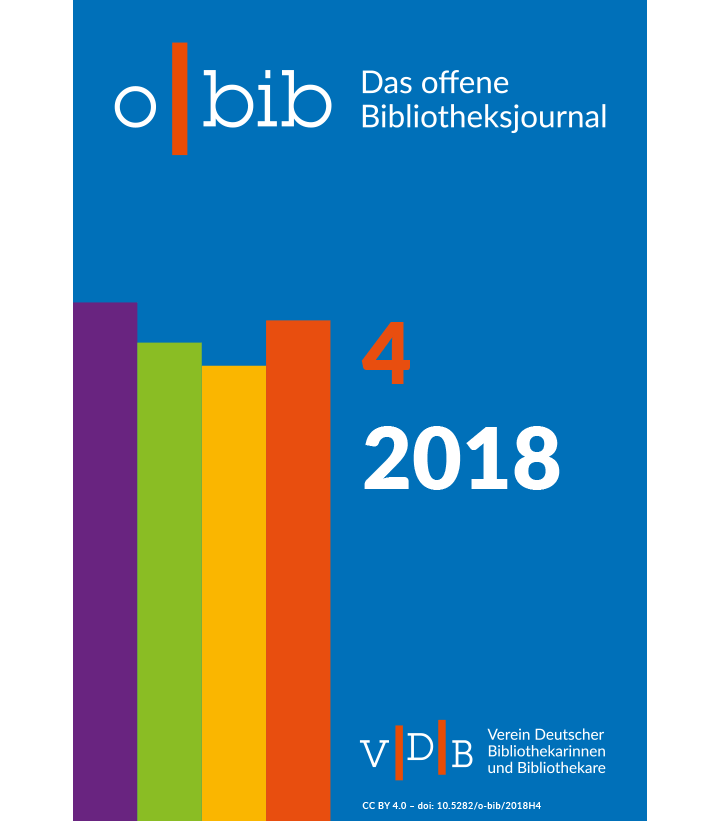Der Open Access Monitor Deutschland
DOI:
https://doi.org/10.5282/o-bib/2018H4S84-100Schlagwörter:
Open Access, Monitoring, Gold Open Access, Green Open Access, TransformationAbstract
Mit Förderung des BMBF und der Allianz der Wissenschaftsorganisationen entwickelt die Zentralbibliothek des Forschungszentrums Jülich den Open Access Monitor Deutschland. Er wird das gesamte Publikationsaufkommen deutscher akademischer Einrichtungen in wissenschaftlichen Zeitschriften erfassen. Durch die Analysen von Subskriptionsausgaben und (Open-Access-)Publikationsausgaben sowie der Zahl der Publikationen in den verschiedenen Publikationsarten kann der Transformationsprozess des Publikationswesens in den Open Access beobachtet und unterstützt werden. Der Open Access Monitor Deutschland baut auf bereits existierenden oder sich in Entwicklung befindlichen Systemen auf und vermeidet so Doppelarbeit sowohl in der Entwicklung als auch im Betrieb. Er wird unter der URL https://open-access-monitor.de verfügbar sein. Dieser Beitrag stellt den Open Access Monitor Deutschland erstmals ausführlich vor.
Literaturhinweise
- Allianz der Wissenschaftsorganisationen: Vertrag über die Durchführung eines Projektes zur Einrichtung eines „Nationalen Open-Access-Kontaktpunkts“, 2016.
- Barbers, Irene; Kalinna, Nadja; Mittermaier, Bernhard: Data-Driven Transition: Joint Reporting of Subscription Expenditure and Publication Costs, in: Publications 6 (2), 2018, S. 19, https://doi.org/10.3390/publications6020019.
- Berlin Declaration on Open Access to Knowledge in the Sciences and Humanities, https://openaccess.mpg.de/Berliner-Erklaerung, Stand: 07.07.2018.
- Bundesministerium für Bildung und Forschung: Open Access in Deutschland. Die Strategie des Bundesministeriums für Bildung und Forschung, https://www.bmbf.de/pub/Open_Access_in_Deutschland.pdf, Stand: 07.07.2018.
- Bundesministerium für Bildung und Forschung: Förderrichtlinie des freien Informationsflusses in der Wissenschaft − Open Access, 26.05.2017, S. 1. BAnz AT 01.06.2017 B8.
- Bundesregierung: Antwort der Bundesregierung, DS 19/1014 vom 27.02.2018, http://dip21.bundestag.de/dip21/btd/19/010/1901014.pdf, Stand: 07.07.2018.
- Jahn, Najko: About the Hybrid OA Dashboard, https://subugoe.github.io/hybrid_oa_dashboard/about.html, Stand: 07.07.2018.
- Jahn, Najko; Tullney, Marco: A study of institutional spending on open access publication fees in Germany, 2016, PeerJ 4:e2323, https://doi.org/10.7717/peerj.2323.
- Stern, Niels: Knowledge Exchange consensus on monitoring Open Access publications and cost data. Report from workshop held in Copenhagen 29-30 November 2016, http://doi.org/10.5281/zenodo.480852.
- Martín-Martín, Alberto u.a.: Google Scholar, Web of Science, and Scopus: a systematic comparison of citations in 252 subject categories, arXiv:1808.05053 [cs.DL], https://arxiv.org/abs/1808.05053.
- Mittermaier, Bernhard: Datenarbeit und „Nationaler Kontaktpunkt Open Access“ − ein Interview mit Dr. Bernhard Mittermaier, in: ABI Technik, 37 (4), 2017, S. 293-296, https://dx.doi.org/10.1515/abitech-2017-0062.
- Mittermaier, Bernhard: Auf dem Weg zu einem Open-Access-Monitor. Vortrag beim Bibliothekartag 2018, Berlin, 12.-15. Juni 2018, http://hdl.handle.net/2128/18854, Stand: 07.07.2018.
- Mittermaier, Bernhard u.a.: Erfassung und Analyse bibliometrischer Indikatoren für den PFI-Monitoringbericht 2018, http://hdl.handle.net/2128/16265, Stand: 07.07.2018.
- Piwowar H. u.a.: The state of OA: a large-scale analysis of the prevalence and impact of Open Access articles, 2018, PeerJ 6:e4375, https://doi.org/10.7717/peerj.4375.
- Projekt DEAL. Bundesweite Lizenzierung von Angeboten großer Wissenschaftsverlage, <https://www.projekt-deal.de/>, Stand: 07.07.2018.
- Schimmer, Ralf; Geschuhn, Kai Karin; Vogler, Andreas: Disrupting the subscription journals’ business model for the necessary large-scale transformation to open access. A Max Planck Digital Library Open Access Policy White Paper, München, MPDL 2015, http://dx.doi.org/10.17617/1.3.
- Sitte, Petra u.a.: Förderung von Open Access in der Wissenschaft und Umsetzung der Open-Access-Strategie des Bundesministeriums für Bildung und Forschung, http://dip21.bundestag.de/dip21/btd/19/007/1900704.pdf, Stand: 08.02.2018.
- Thelwall, Mike: Dimensions: A competitor to Scopus and the Web of Science?, in: Journal of Informetrics, 2018, 12 (2), S. 430-435, https://doi.org/10.1016/j.joi.2018.03.006.
- Universities UK: Monitoring the transition to Open Access, December 2017, https://www.universitiesuk.ac.uk/policy-and-analysis/reports/Documents/2017/monitoring-transition-open-access-2017.pdf, Stand: 18.09.2018.
- University of California Libraries: Pay It Forward, http://icis.ucdavis.edu/wp-content/uploads/2016/07/UC-Pay-It-Forward-Final-Report.rev_.7.18.16.pdf, Stand: 07.07.2018.
- Van Leeuwen, Thed N.; Tatum, Clifford; Wouters, Paul F.: Exploring possibilities to use bibliometric data to monitor gold open access publishing at the national level, in: Journal of the Association for Information Science and Technology, 69 (9), 2018, S. 1161-1173, https://doi.org/10.1002/asi.24029.
- Voigt, Michaela u.a.: Open-Access-Anteil bei Zeitschriftenartikeln von Wissenschaftlerinnen und Wissenschaftlern an Einrichtungen des Landes Berlin. Datenauswertung für das Jahr 2016, https://doi.org/10.14279/depositonce-6866.
- Wohlgemuth, Michael; Rimmert, Christine; Taubert, Niels: Nutzung von Gold Open Access auf globaler und europäischer Ebene sowie in Forschungsorganisationen, Forschungsbericht 18.07.2017, https://doi.org/10.13140/RG.2.2.33235.89120.
- Würthele, Volker: Datenqualitätsmetrik für Informationsprozesse, 2003, Dissertation ETH Zürich https://doi.org/10.3929/ethz-a-004650156.
Veröffentlicht
Ausgabe
Rubrik
Lizenz
Copyright (c) 2018 Bernhard Mittermaier, Irene Barbers, Dirk Ecker, Barbara Lindstrot, Heidi Schmiedicke, Philipp Pollack

Dieses Werk steht unter der Lizenz Creative Commons Namensnennung 4.0 International.





